01 Jan Why You Shouldn’t Use Witch Hazel

Witch hazel is a plant-derived substance that has been used for centuries for its potential medicinal properties. It is commonly found in skincare products, particularly toners and astringents. While some people find witch hazel beneficial for their skin, it may not be suitable for everyone, and there are potential reasons why some individuals might avoid or be cautious with its use:
Skin Sensitivity: Witch hazel contains tannins, which have astringent properties. For people with sensitive skin, the astringent effect can be too harsh and may lead to irritation, redness, or dryness. Individuals with dry or sensitive skin might find witch hazel exacerbates their skin concerns.
Alcohol Content: Some commercial witch hazel products may contain a high percentage of alcohol, which can be drying to the skin. Alcohol can strip the skin of its natural oils, leading to dryness and irritation. If your witch hazel product contains alcohol and you have dry or sensitive skin, it may not be the best choice for you.
Individual Reactions: Skin reactions vary from person to person. While some people may tolerate witch hazel well, others may experience adverse reactions. It’s essential to patch-test any new skincare product, including witch hazel-based ones, to see how your skin reacts.
Not Always Necessary: Some skincare experts argue that astringents, including witch hazel, may not be necessary for everyone. Overusing astringents can disrupt the natural balance of the skin, and for many people, a gentle cleanser and moisturizer are sufficient for maintaining healthy skin.
Alternative Options: There are many alternatives to witch hazel that offer similar benefits without potential drawbacks. For example, gentle toners containing soothing ingredients like chamomile, aloe vera, or rose water may be better suited for individuals with sensitive or dry skin.

